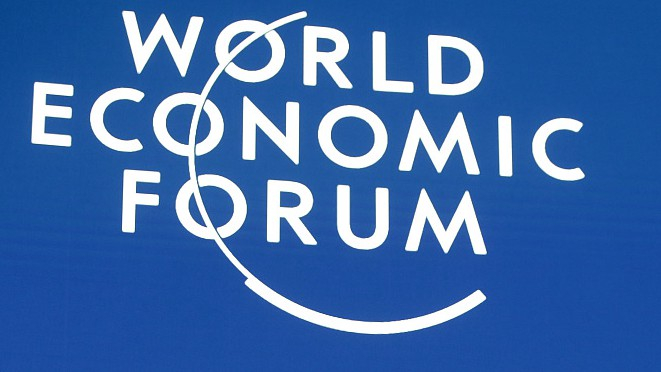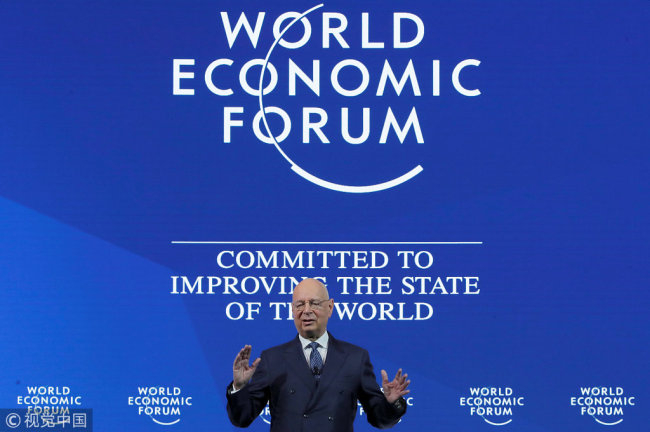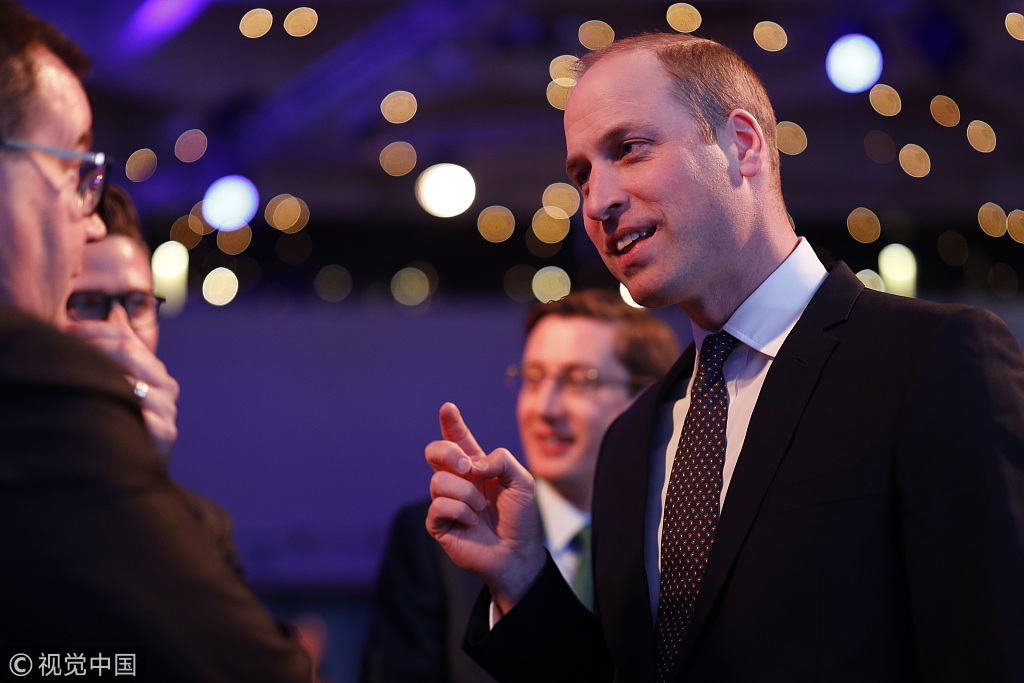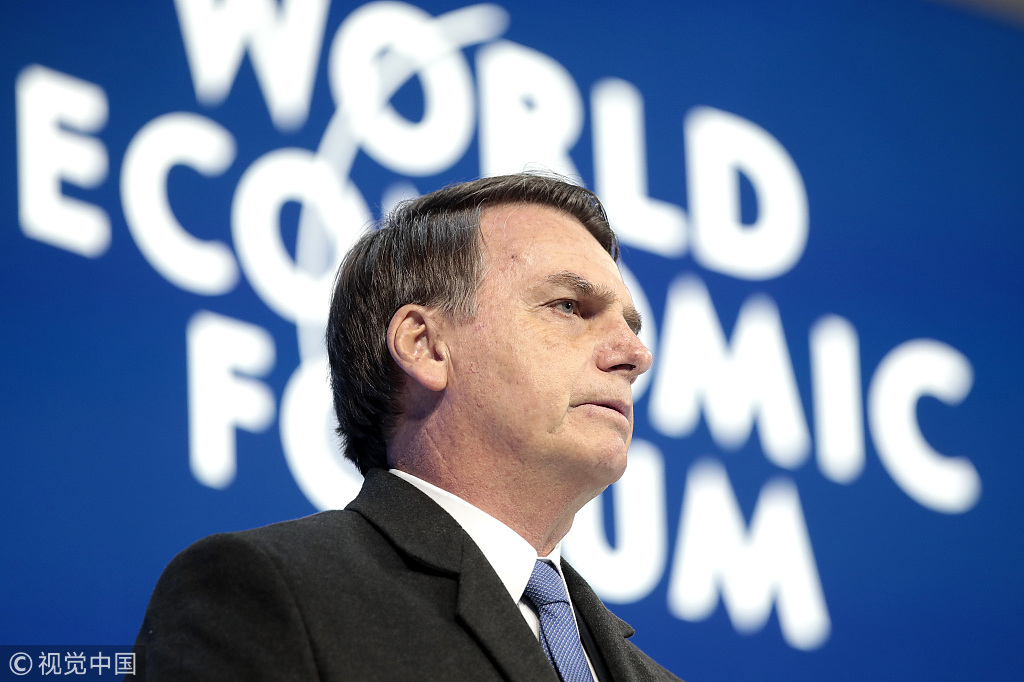
Opinion
11:11, 23-Jan-2019
Opinioin: The future of globalization 4.0 requires countries to work together
Updated
16:42, 23-Jan-2019
China Plus

Editor's note: This article is an edited translation of a commentary from the Chinese-language "Commentaries on International Affairs." published by China Plus on January 22, 2019.
The 2019 annual meeting of the World Economic Forum, which opened in Davos on Tuesday, seems to be somewhat "cold." Due to a partial government shutdown, the U.S. has canceled its attendance. Due to concerns about the continuing "yellow-vest" protest movement, as well as the hosting of the second "Select France" summit, French leaders have also decided not to participate.
The scuttling of the "Brexit" agreement by UK parliament also means that British leaders are not in attendance in Switzerland. In addition, Russian and Indian leaders will also be absent...
The continuing rise of populism and protectionism has brought severe challenges to globalization and free trade. The absence of many leaders from Davos reflects, to some extent, the deep concern about global political and economic uncertainty.
So what happened to the road to globalization? Humankind seems to have come to the crossroads, and is faced with options: Go back or move forward? Stay isolated or choose to cooperate?
Interestingly, the theme of this year's Davos Forum is telling – "Globalization 4.0: Shaping a Global Architecture in the Age of the Fourth Industrial Revolution." It suggests that globalization has not ended, but has entered a new phase.

Founder and Executive Chairman of the World Economic Forum (WEF) Klaus Schwab speaks at the WEF annual meeting in Davos, Switzerland, January 22, 2019. /VCG Photo
Founder and Executive Chairman of the World Economic Forum (WEF) Klaus Schwab speaks at the WEF annual meeting in Davos, Switzerland, January 22, 2019. /VCG Photo
It is generally held that the era of globalization 1.0 refers to globalization before the First World War. The emergence of trains, ships and other means of transportation began allowing for the long-distance transportation of goods. Commodities from various countries began to cross national borders and go global, and global trade grew substantially.
The original industrial revolution was the catalyst for globalization. The era of globalization 2.0 refers to the post-World War II period. People in this era witnessed the formation of a rule-based global governance system, including the United Nations(UN), the International Monetary Fund(IMF), the World Bank(WB) and the World Trade Organization(WTO).
Globalization 2.0 was helped by the emergence of a second industrial revolution, including the widespread use of automobiles and aircraft, reviving global trade that suffered from the effects of two World Wars. The third wave of globalization - 3.0 - saw factories and companies crossing national borders, being joined by both personnel and capital. This created what many have dubbed the 'global village.'
Globalization 4.0 is what most consider the next step forward for humanity, namely the emergence of new technologies such as artificial intelligence, robotics, the Internet of Things and driverless cars being among them. Klaus Schwab, founder and executive chairman of the World Economic Forum, has been quoted, "In this world, globalization won't disappear; it will deepen.
If in the past global integration grew as trade barriers came down, it will now rely on the connectivity of national digital and virtual systems and the related flow of ideas and services. This is the core of Globalization 4.0."

Britain's Prince William, Duke of Cambridge, right, speaks with an attendee between sessions on the opening day of the World Economic Forum (WEF) in Davos, Switzerland, on Tuesday, January 22, 2019. /VCG Photo
Britain's Prince William, Duke of Cambridge, right, speaks with an attendee between sessions on the opening day of the World Economic Forum (WEF) in Davos, Switzerland, on Tuesday, January 22, 2019. /VCG Photo
It is undeniable that one of the challenges of globalization at present is the widening gap between rich and poor. Those with money and technology enjoy special advantages. Competition among those through an open, global system will create losers and winners.
However, a number of developed countries are not playing within that framework, creating schisms within the broader globalization dynamic, which has led to a rise of populism and protectionism, and is fomenting a deepening anti-globalization sentiment.
As Klaus Schwab noted, "Globalization 4.0 has only just begun, but we are already vastly underprepared for it." For example, the massive use of automation and robots has led to fewer jobs, which has given some politicians an excuse to shut down their borders to foreigners while accusing them of stealing jobs.
The World Economic Forum in Davos released its Global Risks Report 2019 last week, warning that continued economic headwinds are being generated by geopolitical tensions among major powers. In 2018, the United States imposed tariffs on many of its international trading partners.
Many view this as the catalyst behind today's trade frictions and global uncertainty. At the same time, the adversarial, "zero-sum" philosophy of 'one winner, one loser' has handicapped the globalization process and brought serious uncertainty to the world economic outlook.

Jair Bolsonaro, Brazil's president, pauses as he delivers a speech during a special address on the opening day of the World Economic Forum (WEF) in Davos, Switzerland, on Tuesday, January 22, 2019. /VCG Photo
Jair Bolsonaro, Brazil's president, pauses as he delivers a speech during a special address on the opening day of the World Economic Forum (WEF) in Davos, Switzerland, on Tuesday, January 22, 2019. /VCG Photo
On the eve of the opening of the World Economic Forum, the International Monetary Fund lowered its global economic growth forecast this year to 3.5 percent, a three-year low.
World Economic Forum President Borge Brende noted, "With global trade and economic growth at risk in 2019, there is a more urgent need than ever to renew the architecture of international cooperation."
He also admits, "We simply do not have the gunpowder to deal with the kind of slowdown that current dynamics might lead us towards." He's now calling for coordinated action by various countries to sustain growth and address the serious threats facing the world today.
So perhaps it's now meaningful to revisit a speech delivered by Chinese President Xi Jinping at the Davos Forum two years ago. He not only pointed out the proper attitude towards globalization, but also emphasized that people should not follow "zero-sum" thinking, but instead adopt a "community of shared future" concept."
In the face of both opportunities and challenges of economic globalization, the right thing to do is to seize every opportunity, jointly meet challenges and chart the right course for economic globalization," said Xi Jinping.
He also stressed that "All countries enjoy the right to development. At the same time, they should view their own interests in a broader context and refrain from pursuing them at the expense of others." In Xi Jinping's view, "when encountering difficulties, we should not complain about ourselves, blame others, lose confidence or run away from responsibilities. We should join hands and rise to the challenge. History is created by the brave."
In fact, 76 percent of respondents in a Davos survey of 10,000 people around the world believe and expect that countries should cooperate for the common good. This suggests the vast majority of people around the world think cooperation between countries is extremely or very important. So it's fitting that Klaus Schwab has noted before the opening of this year's Forum in Davos, "Ready or not, a new world is upon us."
(If you want to contribute and have specific expertise, please contact us at opinions@cgtn.com.)

SITEMAP
Copyright © 2018 CGTN. Beijing ICP prepared NO.16065310-3
Copyright © 2018 CGTN. Beijing ICP prepared NO.16065310-3